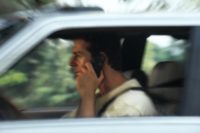Driving is a grown-up activity that requires our full attention, yet a lot of people do it while doing…something else. While texting is the most alarming distraction – and the one that garners the most attention these days – it’s not the only activity that endangers motorists. Eating and drinking, talking to people in your vehicle, fiddling with the stereo, entertainment or navigation system and talking on the phone – even hands free – can all divert your attention away from the task of safe driving.
But back to texting: sending or reading a text takes your eyes off the road for 5 seconds. At 55 mph, that's like driving the length of an entire football field with your eyes closed.
The consequences of distracted driving can also be told in numbers: it claimed 3,166 lives in 2017 alone.
The National Highway Traffic Safety Administration (NHTSA) urges drivers to give the task of driving has your full attention. Any non-driving activity you engage in is a potential distraction and increases your risk of crashing.
Teens
In its efforts to reduce distracted driving, the NHTSA pays special attention to teens, who are less experienced drivers. Additionally, teens are especially active on digital devices and may tend to underestimate the hazards of driving while doing something.
According to the NHTSA” Teens can be the best messengers with their peers, so we encourage them to speak up when they see a friend driving while distracted, to have their friends sign a pledge to never drive distracted, to become involved in their local Students Against Destructive Decisions chapter, and to share messages on social media that remind their friends, family, and neighbors not to make the deadly choice to drive distracted.”
Parents
Parents should set a good, non-distracted example for their teens, as well as having conversations with them about distraction and all of the responsibilities that come with driving.
“Have everyone in the family sign the pledge to commit to distraction-free driving. Remind your teen driver that in States with graduated driver licensing (GDL), a violation of distracted-driving laws could mean a delayed or suspended license,” says the NHTSA.
Teachers
Educators and employers can play a part, too, by spreading the word at your school or workplace about the dangers of distracted driving and asking students to commit to distraction-free driving.
Your state legislature and governor make the laws regarding distracted driving. Many states now have laws against texting, talking on a cell phone, and other distractions while driving. You can visit the Governors Highway Safety Association to learn about the laws in your state.






